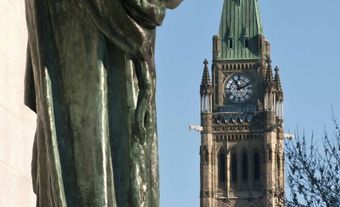Censorship
Censorship is the exercise of prior governmental control over what can be printed, published, represented or broadcast. Soon after the invention of the printing press, the English CROWN resorted to various censorship controls. Printing was allowed only under special licences, and this was reinforced by press offences and given a statutory basis with the Licensing Act of 1662. In 1695, when the House of Commons refused to renew the Licensing Act (not so much out of concern for freedom of expression as for a number of reasons related to commercial restrictions, house searches, etc), prior censorship of the press ended, except during wartime. Freedom of the press has since consisted "in laying no previous restraints upon publication, and not in freedom from censure for criminal matter when published."
Earliest Attempts
However, censorship can be practised in covert ways. One of the earliest attempts to restrict publication was the use of deliberate taxation to inhibit circulation. A Stamp Tax introduced in England in 1712 (and not removed until 1855) required newspapers to affix stamps so that by raising the price of stamps newspaper prices could be raised beyond the purchasing power of all but wealthy readers. Censorship can also be practised through harassment and intimidation. During the "McCarthy era" in the US, the American Supreme Court, in US v Rumely, warned, "Through the harassment of hearings, investigations, reports, and subpoenas, government will hold a club over speech and over the press."
Censorship can also be exercised through the pressure of advertisers and decisions by newspapers themselves, particularly in circumstances where no competitive or alternative source of news is available. In Canada, the concentration of media ownership caused the Royal Commission on Newspapers (1980) to caution that the key problem facing the freedom of the press in Canada is the "undue concentration of ownership and control of the Canadian newpaper industry ...Too much power is put in too few hands; and it is power without accountability."
The Canadian CRIMINAL CODE makes it an offence to mail "obscene, indecent, immoral or scurrilous" matter (see OBSCENITY), and the Post Office Act provides for interruption of such service. Similarly, the Customs Tariff Act prohibits the importation of "treasonable, seditious, immoral or indecent" literature. In Little Sisters Book and Art Emporium (1996), the British Columbia Supreme Court found that the administration and application of the Customs Tariff Act by customs officials was "inadequate and flawed," resulting in the arbitrary and improper seizure of gay and lesbian materials at Canadian borders. Material which promotes hatred against identifiable groups can also be halted at the border, while the Canadian Human Rights Act permits the filing of a court order to cease and desist using the telephone to communicate hate messages (see Canada (HRC) v. Taylor (1990)).
Film Censorship
The best-known attempts by provinces to impose censorship are the various provincial FILM CENSORSHIP Acts. In Nova Scotia Board of Censors v McNeil, the Supreme Court of Canada held that provincial legislation establishing a board of censors with powers to prohibit the exhibition of films was within the jurisdiction of the provinces, despite the federal jurisdiction in the Criminal Code over determination of what is "obscene." On the other hand, in Ontario Film and Video Appreciation Society (1984), the Ontario Court of Appeal has held that s1 of the Canadian Charter, which requires that limitations on Charter rights and freedoms must be "prescribed by law," requires censorship powers to be specifically prescribed.
Other censorship attempts by the provinces have been less successful. Under the 1937 Alberta Press Act to Ensure the Publication of Accurate News and Information, newspapers would be compelled to disclose the source of their news information and to print government statements to correct previous articles. Three of the 6 Supreme Court justices hearing the case held that the bill was an invasion of liberty of the press and the right of public discussion, which could only be limited by Parliament under its CRIMINAL LAW power. In Switzman v Elbling (the PADLOCK ACT case), which dealt with the 1937 Québec Act Respecting Communistic Propaganda, under which it was illegal to use a house for the propagation of communism, the Supreme Court declared this was legislation with respect to criminal law and therefore within federal jurisdiction.
Censorship Can Take Many Forms
To persons or groups who cannot afford to print newspapers, or to advertise, or who might not be given the opportunity to do so, supervision of the distribution of handbills or posters is a form of censorship. This supervision has been effected through municipal bylaws regulating the use of streets, sidewalks and parks, and requiring the prior approval of the police or some civic official before printed materials can be distributed (see SAUMUR V CITY OF QUÉBEC).
In Attorney General of Canada v Dupond, the Supreme Court of Canada held that a city ordinance that prohibited "the holding of any assembly, parade or gathering on the public domain of the City of Montréal for a time-period of 30 days" was valid, being of a "merely local character." But municipalities also must comply with the requirements of the Canadian Charter. In Ramsden v. The City of Peterborough (1995), the Supreme Court of Canada held that a municipal by-law which banned the placing of posters on hydroelectric polls was an unreasonable limit on the freedom of expression. The court recognized that postering was a traditional means of communication by individuals and groups who do not have the financial resources to access the more standard forms of media communication such as print and radio. The court has expanded the requirement that governments must not arbitrarily restrict access to government property for the purposes of expression to include federally government-owned airports (see Committee for the Commonwealth of Canada v Canada (1991)).
The censorship practised under the OFFICIAL SECRETS ACT (1970) essentially covers 2 distinct, if somewhat similar, activities: spying and wrongful communication of government information, or leakage (s4.3). The latter provides: "Every person who receives any ... information, knowing, or having reasonable ground to believe, at the time when he receives it, that the ... information is communicated to him in contravention of this Act, is guilty of an offence under this Act unless he proves that the communication to him of the ... information was contrary to his desire."
In Canada since WWII, this section has been the basis of prosecution only twice. However, a recent example in the UK illustrates the extent of possible censorship under the Official Secrets Act. In 1987 the House of Lords upheld a banning of the book Spycatcher by Peter Wright on the ground that he had breached his oath under the Act when he tried to publish the book, which was based on his experience in the British Security Service known as MI5 (Attorney-General v Guardian Newspapers Ltd).

 Share on Facebook
Share on Facebook Share on X
Share on X Share by Email
Share by Email Share on Google Classroom
Share on Google Classroom


